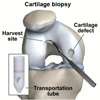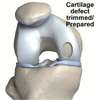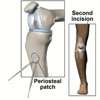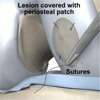Carticel Reimplantation
Treatment with Carticel

Carticel uses your own cartilage cells (chondrocytes) to repair the articular cartilage damage in your knee. When implanted into a cartilage injury, your own cells can form new cartilage; this new cartilage is very similar to your original cartilage. The Carticel implantation procedure is called Autologous Chondrocyte Implantation or ACI. It is a two-step process.
Knee Cartilage Arthroscopy and Biopsy

In the first step, during an arthroscopic procedure, your surgeon assesses the extent of your cartilage damage. If your surgeon believes you are a candidate for Carticel implantation, he may take a sample or "biopsy" of healthy tissue about the size of two Tic-Tacs®. This sample is sent to Genzyme Biosurgery.
Carticel Manufacturing and Delivery
Your biopsy can be stored for up to two years, so you can schedule your surgery at your convenience. When you are ready, your cells are cultured at our state-of-the-art cell processing facility; over three to five weeks they increase to approximately 12 million cells. Every step of the manufacturing process is monitored to ensure high quality and safety. A courier delivers your cultured cells (Carticel) hours before your surgery.
Cartilage Injury Cleaned

During the second stage of Carticel implantation, your surgeon makes an incision to expose your knee and removes any dead or damaged tissue from the injury, leaving only healthy tissue.
Periosteal Patch

Your surgeon takes a small piece of tissue from your shin-bone and sews it securely over the injury.
Carticel Implantation Patch
Your surgeon injects Carticel under the patch. When Carticel is surgically implanted into a cartilage injury, it can grow and form new hyaline-like cartilage, with properties similar to those of the original cartilage. Repairing the injury helps to reduce pain and improve movement and function.
